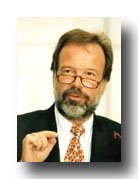
I had the unique pleasure of meeting Norbert Walter almost a year ago at a Rand Conference. I found his initial comments at the meeting refreshingly blunt: to parphrase: "Unlike my colleages I have not aspirations to win a Nobel Prize. I have achieved everything I have wanted. Threfore, I shall present my honest opinions to you" ...or something to that effect. I immediately LIKED this guy. Blunt, to-the-point, and quite ready to not take any political hype crap from anyone. His website is extremely informative and his views are very insightful. I would strongly encourage you to click through on the link above.
"Prof. Dr. Norbert Walter is chief economist of Deutsche Bank Group and head of Deutsche Bank Research, and he holds a doctorate in economics from the Johann-Wolfgang-Goethe University, Frankfurt/Main. At the conference in 2003, he spoke stated that Europeans still think of themselves “like a group of tribes”, rather than as a European Union. He emphasised the importance of unity to the EU becoming a world economic force." (http://support.sas.com/events/sasforuminternational2006/speakers_keynote_previous.html)
For a new energy strategy
January 31, 2006
It's a hot issue. It' s causing more and more worries. The effects are to be seen everywhere. But there's no sign of a strategy to deal with it. The talk goes on almost incessantly - same as ever.
When energy is the issue, you have to consider economic, ecological and security aspects. And anyone who loses sight of technological advances won't come up on top, because energy projects require long planning and exploitation times. The fact of the matter is: energy is very scarce - not least because of energy-intensive production in dynamically growing emerging markets. The fall-out is the rapid and continuing increases in the price of oil and gas, particularly since the level of investment in expanding facilities for fossil-fuel production is low, the building of nuclear power plants has de facto ended (in Germany at least), and the expansion of capacities for renewable energies is selective. Besides, there are still some countries that do not even let world-market prices for energy feed through to the user level. And only in certain parts of the world are the environmental costs of energy use charged to the consumer (emission certificates, fuel taxes).

This is a tight situation, one in which we are far from having digested all the consequences of higher crude oil prices, and further risks loom ahead. The dispute with Iran over its nuclear activities threatens to seriously jeopardise the safety of oil and gas supplies. One reason is potential disruptions to Iranian oil deliveries, but another is the possibility of Iranian attempts to disrupt oil shipments along the Strait of Hormuz. And this uncertainty factor is only one of many. At the beginning of the year the degree of European dependence on Russian gas and politically endangered pipelines became painfully clear.
It would be in almost everyone's interests if we did everything in our power to address the issue. In many areas, Germany can hold its own respectably well. In others, it's time to leave the cul-de-sac. The world ought to achieve greater energy savings and increased cost efficiency with a combination of eco-tax and emission rights trading. We should not switch off comparatively safe nuclear power plants before the end of their economic lifetime. We should not only push ahead with renewable energies in our own country but also market this successful business model internationally (wind parks in Patagonia and the Gobi Desert). We should decentralise energy supply via the use of biomass. We should foster interdisciplinary use of innovations for hydrogen as an energy carrier across different sectors of the economy (e.g. energy, automobiles and plant construction). And in the context of strategy we Germans should elevate energy policy at least to the European if not the global level.
Rheinischer Merkur, January 26, 2006
Other interesting things:
http://users.ox.ac.uk/~ball1024/Norbert_Walter_EuropaMagazine.pdf
Some really wonderful papers about Energy:
http://www.dbresearch.com/servlet/reweb2.ReWEB;jsessionid=a%3A44164978%3Acb8c439a3012b01b?rwkey=u1563380
especially this one:
Silicon as an intermediary between renewable energy and hydrogen
Non-renewable energy sources are becoming depleted. Air and water (our environment) are precious and will be under increased jeopardy without effective energy and environmental policies. A hydrogen technology based upon solar energy represents a viable solution to these problems. Silicon successfully functions as a tailor-made intermediate linking decentrally operating renewable energy-generation technology with equally decentrally organised hydrogen-based infrastructure at any location of choice. The transport and storage of silicon are free from potential hazards and/or high energy losses and require a simple infrastructure similar to that needed for coal
No comments:
Post a Comment